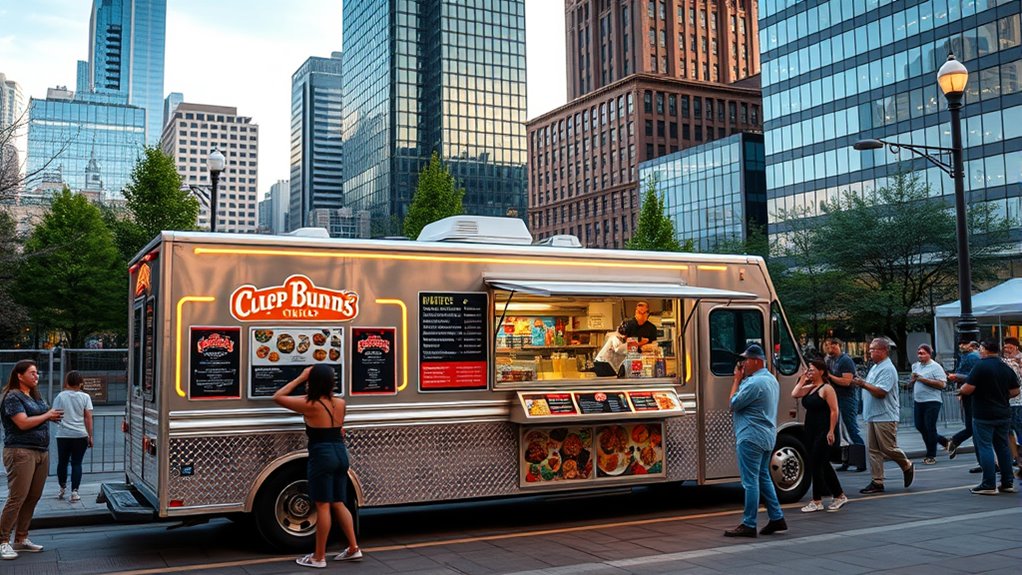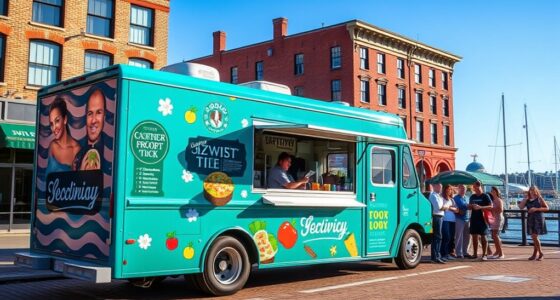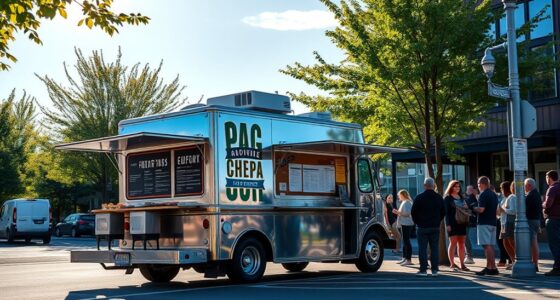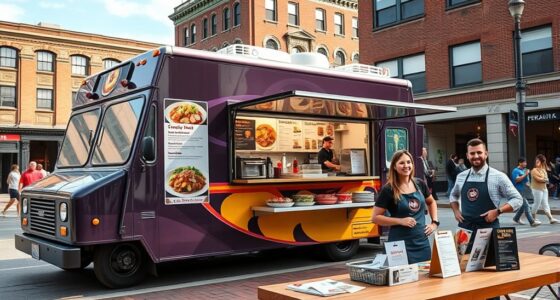To start a food truck in Cleveland, Ohio, you need to secure permits like a Mobile Food Vendor License, health and fire safety approvals, and make sure your vehicle complies with zoning laws. Budget for vehicle costs, equipment (~$18,000–$42,000), permits, and ongoing expenses. Find approved locations, develop a compliant menu, and prioritize food safety standards. Effective marketing through social media and local events will help you grow—if you continue exploring, you’ll find all the essential steps to launch your truck successfully.
Key Takeaways
- Obtain necessary permits including Mobile Food Vendor License, Health Permit, and fire safety certificates; permits must be renewed annually.
- Budget $20,000–$150,000 for truck purchase or retrofit, plus equipment, licensing, and initial inventory costs.
- Comply with Cleveland zoning laws, secure private property permissions, and adhere to distancing rules from residences and other trucks.
- Develop a compliant menu with licensed preparation, ensure equipment meets safety standards, and maintain proper food safety practices.
- Promote your truck through local events, partnerships, and social media to attract customers and build brand visibility.
Navigating the Permitting Process in Cleveland
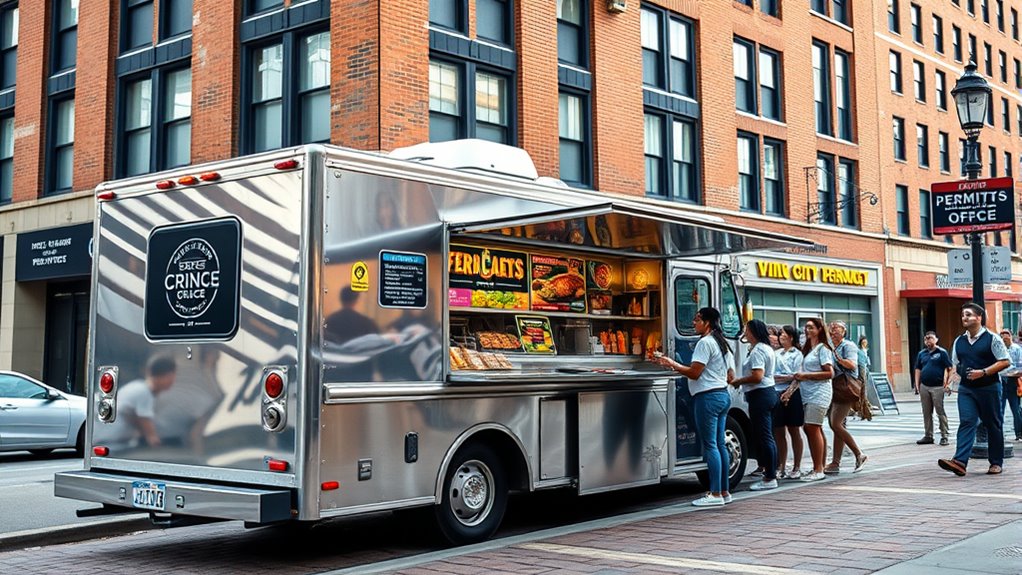
Guiding the permitting process in Cleveland can seem complex, but understanding the essential steps makes it manageable. First, you need to obtain a Mobile Food Vendor License from the city, along with a Health Permit after passing a Cleveland Department of Public Health inspection. You’ll also require an Ohio Sales Tax Permit from the state to collect sales tax. For each vending unit, submit vehicle registration and proof of ownership, and if using propane or flammable substances, get a Certificate of Inspection from the Cleveland Division of Fire. Your application must include detailed drawings of your truck, manufacturer specs, a menu, and proof of a licensed commissary kitchen. Be prepared to schedule fire safety inspections, display permits visibly, and guarantee compliance with zoning and fire safety regulations. Additionally, permits must be renewed annually, ensuring your operation remains compliant with city regulations and safety standards. Proper documentation and adherence to local regulations are crucial for avoiding penalties and ensuring smooth operation.
Budgeting for Startup and Ongoing Expenses
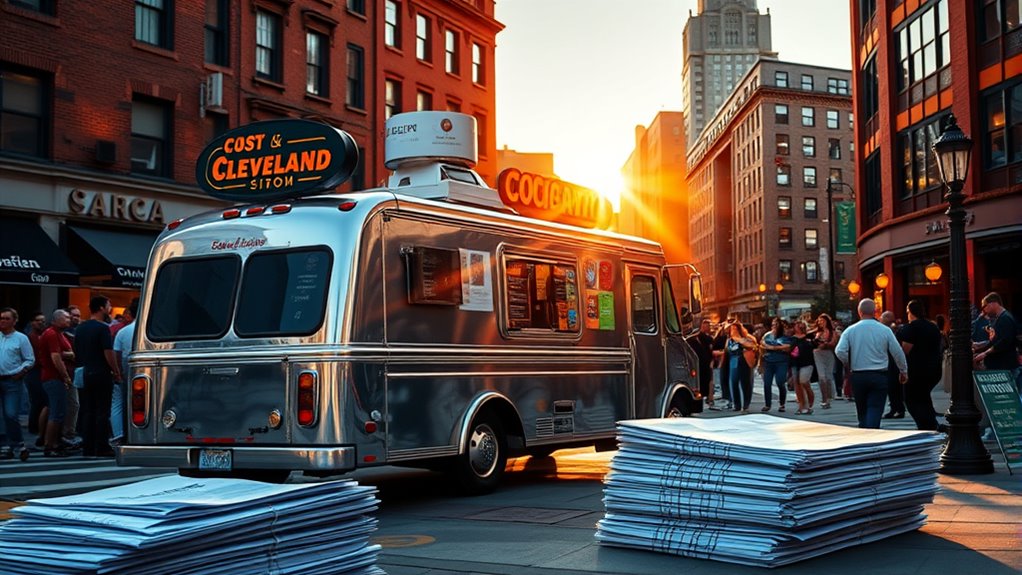
Budgeting effectively for your food truck startup and ongoing expenses is essential to guarantee a profitable venture in Cleveland. Startup vehicle costs vary widely: a new truck can range from $50,000 to $150,000, while used options cost between $20,000 and $60,000. Equipment expenses, including cooking devices and refrigeration, typically total $18,000 to $42,000. Don’t forget initial fuel, maintenance, and leasing costs—monthly lease payments range from $1,000 to $3,000. Licensing and permits cost around $200 to $300 annually, with health and fire safety inspections adding to expenses. Initial inventory, packaging supplies, and disposables usually require $3,000 to $7,500 upfront. Ultimately, budget for insurance premiums, which depend on coverage and truck size, and marketing efforts starting at about $1,000. Understanding local regulations can help avoid unexpected costs and ensure compliance. Additionally, AI-driven safety measures are increasingly being utilized to maintain safety standards and reduce liability risks.
Finding the Perfect Vending Locations and Zoning Compliance
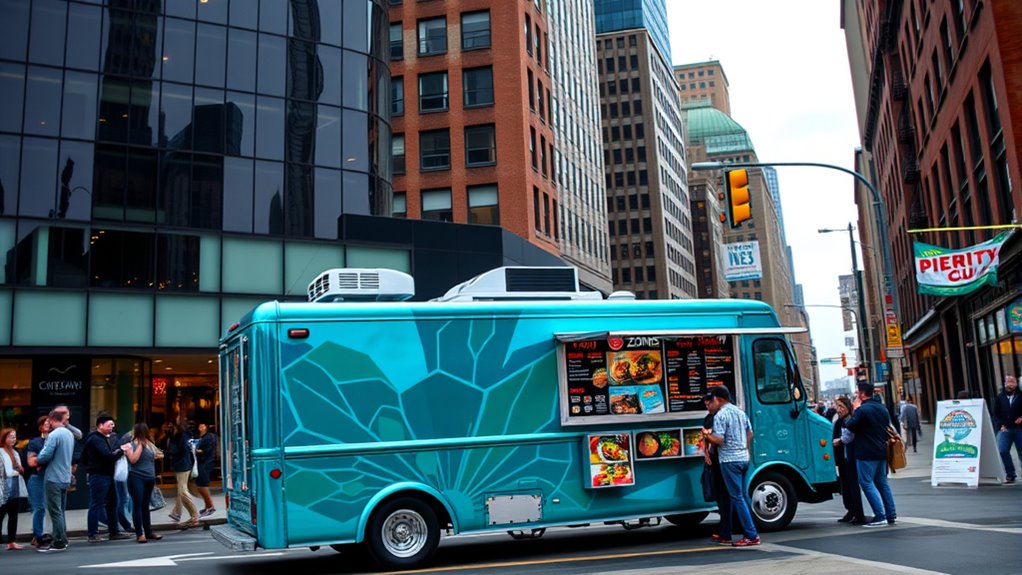
To find the right vending spots, you need to understand Cleveland’s zoning laws and restrictions, especially near sensitive areas like schools and residential zones. Make sure you get written permissions from private property owners and city approval for any public or city-owned locations. Keep in mind, there are specific zones and distances you must respect to stay compliant and avoid penalties. Understanding these regulations is crucial to ensure your vending operations run smoothly without legal issues. Additionally, adhering to ethical standards in your interactions with property owners and local authorities can help build trust and support for your business venture.
Zoning Regulations Overview
Finding the right vending location in Cleveland requires understanding the city’s zoning regulations and restrictions. You can’t operate on public sidewalks within the Central Business District without a permit, and food trucks must stay at least 100 feet away from brick-and-mortar food services during their hours. There are also rules about maintaining minimum distances from other trucks—5 feet generally, or 50 feet in the downtown area—and avoiding proximity to gas stations or busy streets. Vending is prohibited near residential zones, schools, hospitals, and government buildings. Sidewalk clearance is essential: you need at least 6 feet of unobstructed pedestrian space and restrictions on truck size and operation hours. Downtown and neighborhood districts may have additional rules, so check local regulations before choosing a location. Additionally, organized vending zones may be established by city authorities to facilitate compliant vending operations in certain areas. Understanding zoning regulations thoroughly can help avoid potential legal issues and fines.
Private Property Permissions
Securing private property for your food truck requires obtaining clear permission from the property owner before you set up shop. You’ll need a notarized authorization letter that includes the owner’s name, address, and phone number. If you own the property, proof of ownership can replace this documentation. For city-owned sites, separate approval from the Director of Public Works is necessary. Your written permission must be specific, legible, and clearly authorize your operation. Keep in mind, vending on residential private property is generally prohibited unless for places like schools or churches. You must also follow distance requirements—maintain at least 10 feet from residences, driveways, and sidewalks, and avoid obstructing vehicle or pedestrian traffic. Proper permits and insurance are essential for legal operation on private property. Understanding local zoning laws is crucial to ensure your vending activities comply with all regulations and avoid potential fines or shutdowns. Additionally, being aware of zoning restrictions can help you identify suitable locations that are compliant with city ordinances.
Restricted Vending Zones
Understanding Cleveland’s vending zones is essential for locating your food truck legally and successfully. The city enforces zoning rules that restrict where vendors can operate, depending on district types like Downtown, Neighborhood Commercial, or Historic areas. Organized vending zones are designated by the city with input from planning and council, making compliance easier. You must stay at least 10 feet from sidewalks (or 20 feet if set back), 50 feet from gas stations, and 750 feet from city-sanctioned events unless authorized. Vending near residential neighborhoods, hospitals, government buildings, or on certain streets is prohibited. Sidewalk vendors must maintain six feet of pedestrian clearance. Full property owner permission is required for private or city-owned sites. Knowing these restrictions helps you find compliant, safe locations for your food truck. Vending regulations also prohibit placing food items directly on streets or sidewalks, ensuring that vendors do not obstruct pedestrian pathways or traffic flow. Additionally, understanding zoning compliance can prevent potential legal issues and fines, supporting your long-term success.
Designing a Menu That Meets Regulations and Attracts Customers

Designing a menu that both complies with Cleveland and Ohio food regulations and attracts customers requires careful planning. You need to feature items prepared in your unit or by licensed processing facilities, avoiding home-prepared foods. Confirm your complete menu is submitted for approval and posted visibly in your truck. Any changes must be approved beforehand. Focus on foods that maintain proper temperatures during service and are easily standardized, helping you stay compliant. Use clear descriptions within signage limits to draw in customers and consider seasonal or rotating options approved in advance. Highlight local or ethnic favorites with simple prep methods to appeal to Cleveland’s diverse audience. Keep your menu straightforward, with minimal high-risk or complex items, to streamline operations and ensure consistent quality. Implementing efficient general ledger coding can assist in tracking costs and sales, supporting your financial management as you grow.
Ensuring Food Safety and Equipment Standards
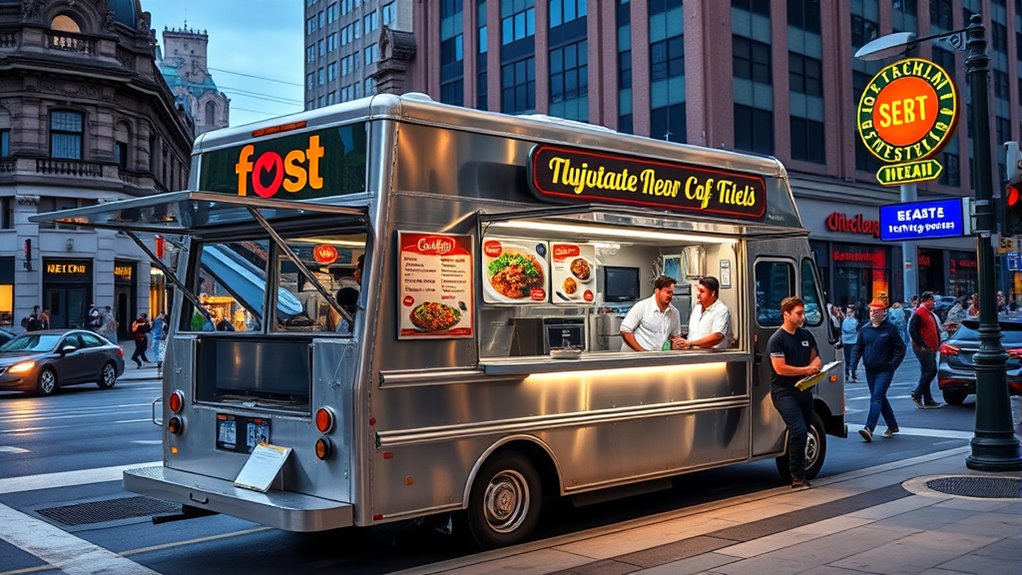
You need to guarantee your cooking equipment meets commercial standards, including proper installation of grills, warmers, and sinks. Plumbing and water systems must provide safe, reliable access to hot and cold water, with regular inspections required. Additionally, all food preparation must follow strict regulations to keep your operation compliant and your customers safe. The regional inspection program ensures that mobile food units undergo thorough safety checks, helping to maintain consistent safety standards across the area. Ensuring that your equipment is properly maintained and inspected is crucial for ongoing compliance and safety.
Commercial Cooking Equipment Requirements
To guarantee food safety and meet local health standards, all cooking equipment on your Cleveland food truck must be commercial-grade, properly installed, and certified for safety. Your appliances, such as grills, fryers, ovens, and stovetops, need to comply with local health and safety codes, ensuring they’re suitable for mobile use. They must be securely fastened or permanently installed to prevent movement during transit. Certification from agencies like UL or NSF confirms the equipment’s safety and compliance. If using open flames or deep fryers, you must incorporate automatic fire suppression systems. Regular maintenance and cleaning are essential to prevent contamination, and your equipment should support proper temperature control for cooking, hot holding, and cooling. This guarantees both food safety and smooth operation of your food truck. Additionally, adhering to industry standards ensures customer safety and legal operation, which is crucial for building trust and avoiding fines. Proper staff training on equipment use is also vital to maintain safety and efficiency.
Plumbing and Water Systems
Ensuring your food truck’s plumbing and water systems meet safety and code standards is essential for compliant operations and food safety. You must obtain a plumbing permit from Cleveland for installation or modifications, and licensed, insured contractors must handle the work. Water permits from the Division of Water are also required, with separate applications for water service. Your plumbing system should include a water supply capable of delivering hot water, with at least 5 gallons of potable water storage. Proper sink systems—handwash and three-compartment sinks—are mandatory, supporting hygiene and sanitation. Regular inspections of plumbing and water systems are necessary to maintain compliance and prevent issues. It is also important to monitor water pressure and temperature regularly to ensure consistent and safe operation. Use corrosion-resistant, sealed fittings to prevent leaks and contamination, and regularly empty wastewater tanks at approved sites to maintain sanitation and compliance.
Food Preparation Regulations
Adhering to food preparation regulations is crucial for maintaining food safety and meeting equipment standards on your Cleveland food truck. You must complete a mandatory food safety certification covering cross-contamination, temperature control, and hygiene. Proof of certification is required for your permit application, and refresher courses may be necessary. Health inspections by the Cleveland Department of Public Health ensure your truck complies with sanitation, storage, and safety standards. Using a licensed commissary kitchen for food prep and storage is also compulsory, helping prevent contamination. Additionally, your truck must meet fire safety codes, with proper ventilation, fire suppression systems, and certified LP equipment. Regular sanitation and adherence to local ordinances are critical to avoid fines and operational disruptions.
| Requirement | Description |
|---|---|
| Food Safety Certification | Mandatory for all handlers; includes hygiene, cross-contamination, temperature control |
| Health Inspection | Ensures compliance with sanitation, storage, and safety standards |
| Commissary Kitchen | Must be licensed; used for prep, storage, and waste disposal |
| Fire Safety | Meets Ohio and Cleveland fire codes; includes inspections, extinguishers, LP certification |
| Sanitation & Ordinances | Maintains cleanliness; adheres to local rules on signage, hours, and waste management |
Effective Marketing Strategies for Cleveland Food Trucks
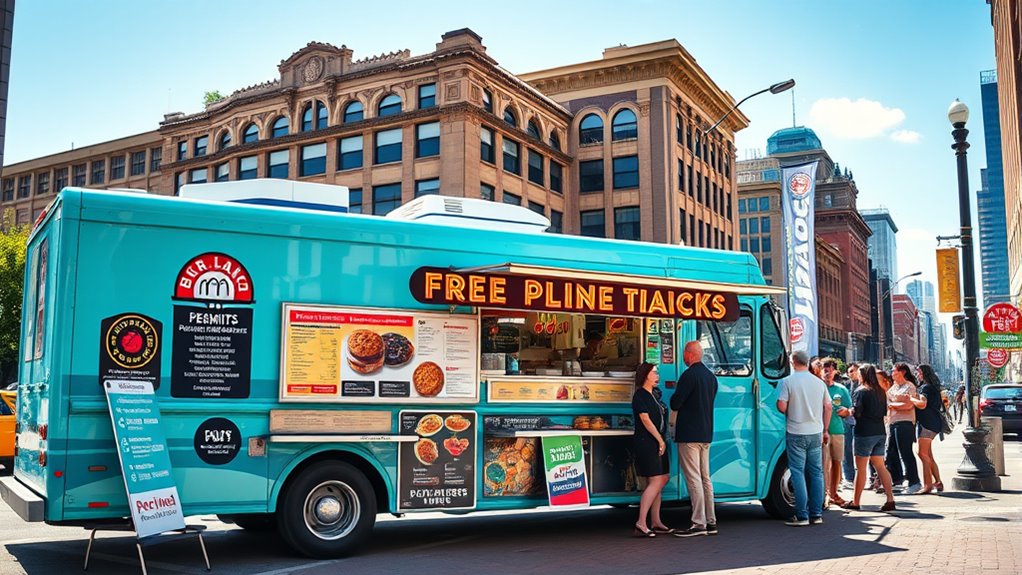
Effective marketing is essential for your Cleveland food truck to stand out in a competitive scene. To attract customers, leverage local events and festivals like the Cleveland Food Truck Rodeo and Downtown Cleveland’s Food Truck Series. These gatherings draw large crowds and provide excellent promotional opportunities. Partner with community events hosted by Downtown Cleveland, Inc., and seasonal festivals to boost visibility in high-traffic areas. You should also use digital and social media marketing to build a loyal following. Share your daily locations, menu specials, and event participation on platforms like Instagram and Facebook. To maximize your reach:
- Use geo-targeted ads and promotions
- Share high-quality photos and videos
- Collaborate with local influencers
Combining these strategies will help you stand out and grow your Cleveland food truck business. Industry growth in Cleveland has shown a significant increase in recent years, making local marketing efforts even more critical for success.
Tips for Successful Operations and Growth
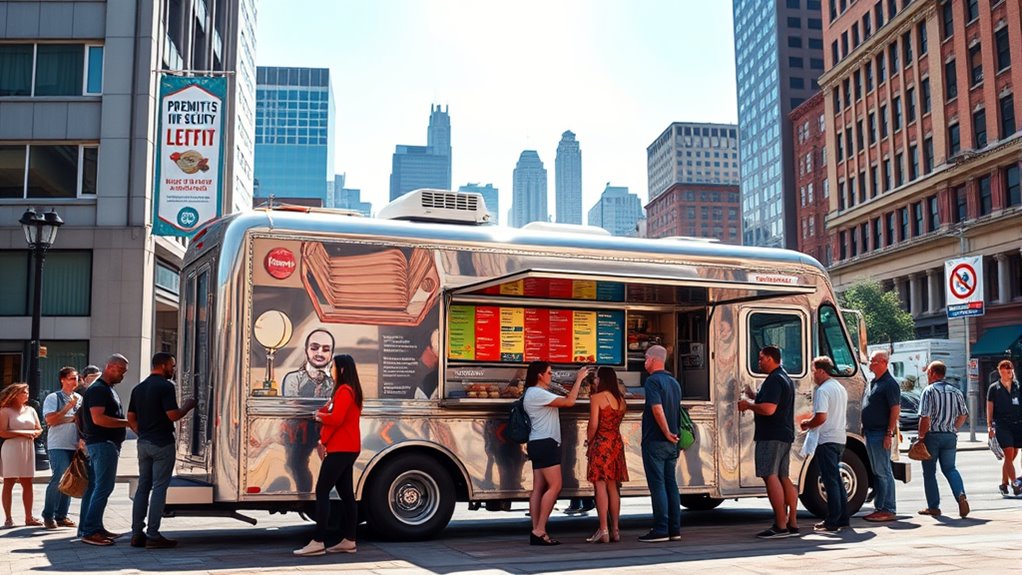
Running a successful food truck in Cleveland requires careful operational management and strategic growth efforts. Focus on keeping costs in check, as profit margins typically range from 7-15%. Use a commissary for cleaning and sanitation, as mandated, to guarantee compliance and smooth operations. Track daily customer volume—often 50 to 100 during peak seasons—to optimize staffing and inventory. Limit your menu to 5-8 core dishes for quick service and consistent quality. Monitor expenses closely to maintain profitability, considering the national average revenue of around $346,000. Expand your income through catering and event participation, targeting festivals, corporate events, and indoor venues during winter. Invest in staff training and build partnerships with local businesses to sustain growth and improve customer satisfaction. Industry growth and market size indicate ongoing opportunities for expansion through niche markets like catering and regional cuisine, which can further diversify your revenue streams.
Frequently Asked Questions
How Long Does the Entire Cleveland Food Truck Permit Approval Process Typically Take?
The entire Cleveland food truck permit approval process usually takes about 1 to 2 months. You’ll need to submit your application, pass health and fire safety inspections, and guarantee compliance with zoning rules. Delays can happen if your paperwork isn’t complete or if inspections are scheduled later. To avoid setbacks, it’s best to start your permit process at least 60 days before you plan to operate.
Are There Specific Insurance Requirements Beyond Minimum Coverage for Cleveland Food Trucks?
You need more than just minimum coverage to operate your Cleveland food truck legally and safely. Besides general liability, you’ll require commercial auto, property, and possibly product liability insurance. Cleveland often demands at least $1 million in liability coverage, and additional options like umbrella, physical damage, or system breakdown insurance can protect against costly claims or equipment failures. Always check local requirements and work with an insurance agent to tailor your coverage.
Can I Operate My Food Truck in Cleveland Without a Commissary Kitchen?
You can’t operate your food truck in Cleveland without a licensed commissary kitchen. Cleveland’s health department requires all mobile vendors to prepare, store, and clean food in approved facilities. Operating without one risks permit denial, fines, and shutdowns. You must budget for commissary fees and find a compliant kitchen. Using your truck alone isn’t enough — the law mandates a licensed commissary to guarantee food safety and regulatory compliance.
What Are the Restrictions on Operating Hours for Food Trucks in Cleveland?
You need to follow Cleveland’s rules on food truck hours. Generally, you can operate from 8:00 a.m. to 4:30 p.m. on weekdays, but some areas allow broader hours, like 7:00 a.m. to 10:00 p.m., with restrictions. You can’t work outside permitted times without special permits. Keep in mind, residential zones and proximity to brick-and-mortar restaurants may impose additional limitations on your operating hours.
Do I Need Special Permits for Seasonal or Event-Based Vending in Cleveland?
You might worry about permit complexities, but Cleveland simplifies seasonal and event vending. Yes, you need a Seasonal Vendor Permit if operating during specific seasons, and a Mobile Food Shop Location Permit for mobile units. For festivals or special events, additional permits and safety inspections are necessary, including liability insurance. Planning ahead guarantees you stay compliant, avoid fines, and enjoy seamless vending at Cleveland’s lively events and seasons.
Conclusion
Starting your Cleveland food truck might seem overwhelming, but with the right permits and planning, you can turn passion into profit. Think of permits as your ticket to legal operation—without them, you’re just dreaming. Balancing costs and crafting a menu that excites customers guarantees success. Remember, in this fast-paced city, adaptability is key. Embrace the challenge, and your food truck will stand out amid Cleveland’s vibrant food scene.
